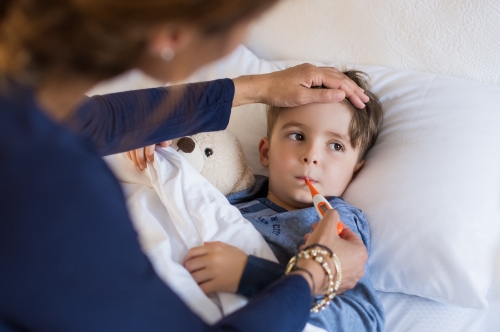Grownups might not think twice about taking over-the-counter (OTC) drugs to ease the symptoms of a cold, but cough and cold medicines can pose serious risks for children under 4 years of age.
The truth is, there’s no cure for the common cold. Antibiotics can be used to fight bacterial infections but are ineffective against viruses, which cause colds. So if your child has a cold, antibiotics won’t help. The more that your child uses antibiotics, the more likely he or she might get sick with an antibiotic-resistant infection in the future. You can also end up with an unnecessary rash because some antibiotics conflict with viruses and this rash can be confusing as to a true medication allergy versus antibiotic interaction with virus (not a true allergy).
It’s a natural parental desire to want to minimize your baby’s symptoms, however the Food and Drug Administration (FDA) removed all OTC “cough and cold” medications. This is because those medications do not treat the root cause (a virus) and there are possible severe side effects. Roughly 6% of Emergency Room visits for medications were children experiencing side effects from over the counter medications. Even for children over 4 years old, there should be extreme caution when considering any OTC medications. Although a medication may be marketed for a child and available without a prescription and although it may be “natural” there are risks.
But my child is up all night coughing? While it is helpful to have a good night sleep, coughing is an important and protective mechanism for the body. Honey has been shown to be as effective for cough relief as an OTC cough suppressant. The cough will resolve when your child’s body fights off the virus causing the cold.
Common pain relievers such as acetaminophen (Tylenol.) or ibuprofen (Advil, Motrin) can reduce a fever and alleviate a sore throat or headache, but try to remember that low-grade fevers actually help to fight an infection. As a rule of thumb, avoid giving ibuprofen to babies younger than 6 months. Do not give aspirin to anyone under the age of 18. When in doubt, consult your pediatrician.
There also exists the danger of OTC cough and cold products containing multiple medication ingredients that can lead to accidental overdosing. Parents should take care to read the drug facts label and adhere to instructions on cold and cough products that state: “do not use in children under 4 years of age.” Simply put, children should not be given any medicine explicitly made for adults.
While there’s no remedy for the common cold, that doesn’t mean there aren’t other things you can do to help soothe your baby or child, here are some tips to consider:
- A cool mist humidifier can soothe nasal passages and may help your child breathe easier. To prevent mold growth, change the water daily and follow the manufacturer’s cleaning instructions
- Saline nose drops or spray keep nasal passages moist and helps avoid stuffiness
- Nasal suction bulbs draws mucus out of the nose for infants less than a year old
- < > or cold beverages might feel good on a sore throat. For an older child, gargling salt water or sucking on a throat lozenge might offer additional relief. Hard candy and lozenges can be choking hazards for younger children and should be avoidedDrinking plenty of liquids such as water and juice will help children stay hydrated and can help loosen congestion. Warm liquids such as tea or broths can also have a soothing effect and increase the flow of nasal mucus
- Teach your child to wash his or her hands thoroughly and often and encourage children to cough or sneeze into a tissue or crook of your arm to avoid spreading germs to others
- Make sure your child is up to date on his or her vaccinations, including the yearly flu vaccine.



